Table of Contents
Political text messaging has quickly become a staple in political campaigns. The 2022 election cycle saw over 15 billion political texts sent to Americans—about 50 per person!
Texting is the quickest, most direct, and most effective way for campaigns to engage with voters, rally support, and ensure they cast their votes.
In this blog, we’re diving into the various types of political texting campaigns that you can use, the tools, and how texting can play a pivotal role in winning elections.
Let’s break it down!
Why is everyone talking about political text messaging?
Political text messaging has become an essential political tool for campaigns aiming to engage voters, mobilize supporters, and disseminate crucial information. Its significance can be attributed to several factors:
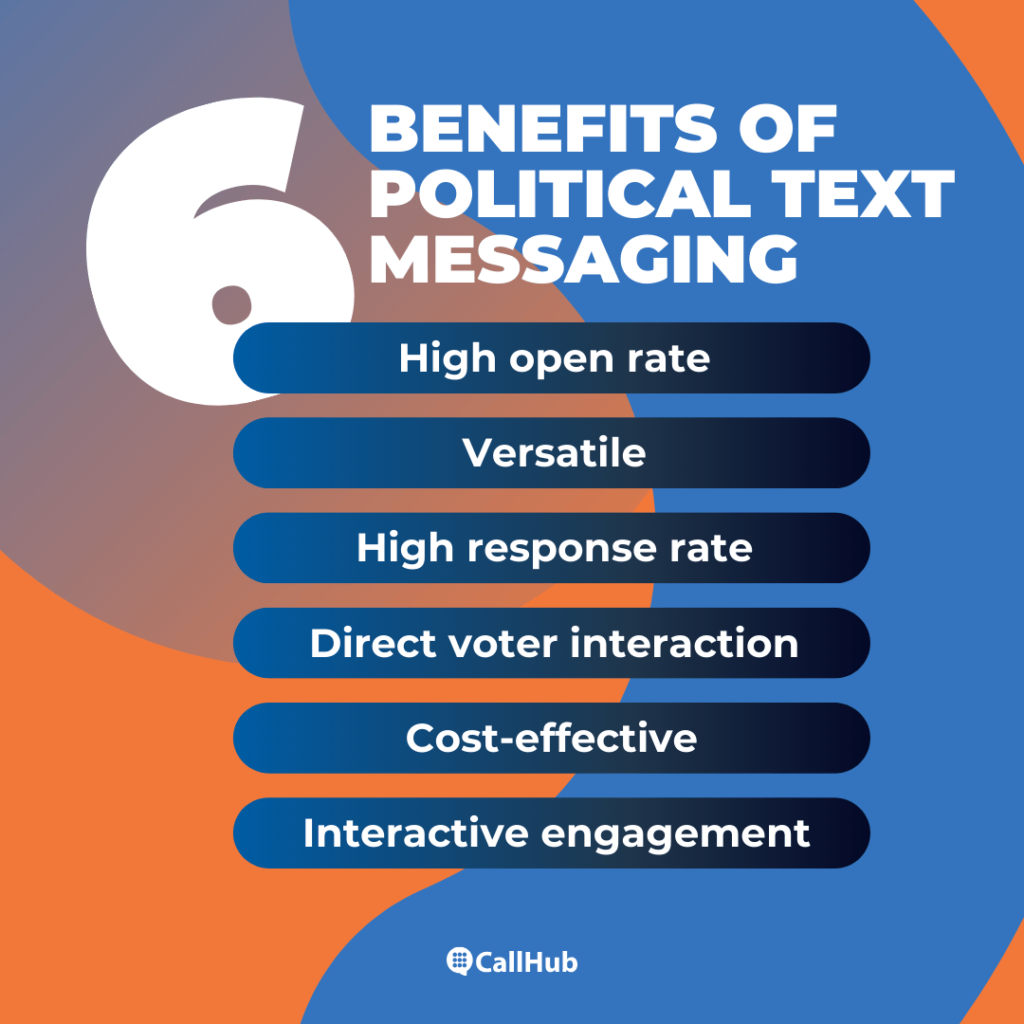
- High open rate: Text messages boast an open rate of 98%, significantly higher than emails or phone calls.
- High response rate: Texts are typically read within 3 minutes of receiving, ensuring timely communication of campaign messages.
- Direct voter interaction: Political SMS allows campaigns to reach voters directly, fostering personal connections and trust.
- Cost-effective: Text messaging enables campaigns to reach a large audience relatively cheaply, making it a budget-friendly communication strategy.
- Versatile: Text messaging can be used for various campaign goals, from opt-in text messaging to GOTV texts
- Interactive engagement: Texts naturally encourage voters to engage in conversation, allowing two-way conversation.
These points make political text messaging a powerful strategy for outreach in politics, enabling efficient and effective voter engagement.
Read Also: Importance of text banking in politics
Case Study: Sheila for Congress – Utilizing CallHub’s MMS Broadcasts
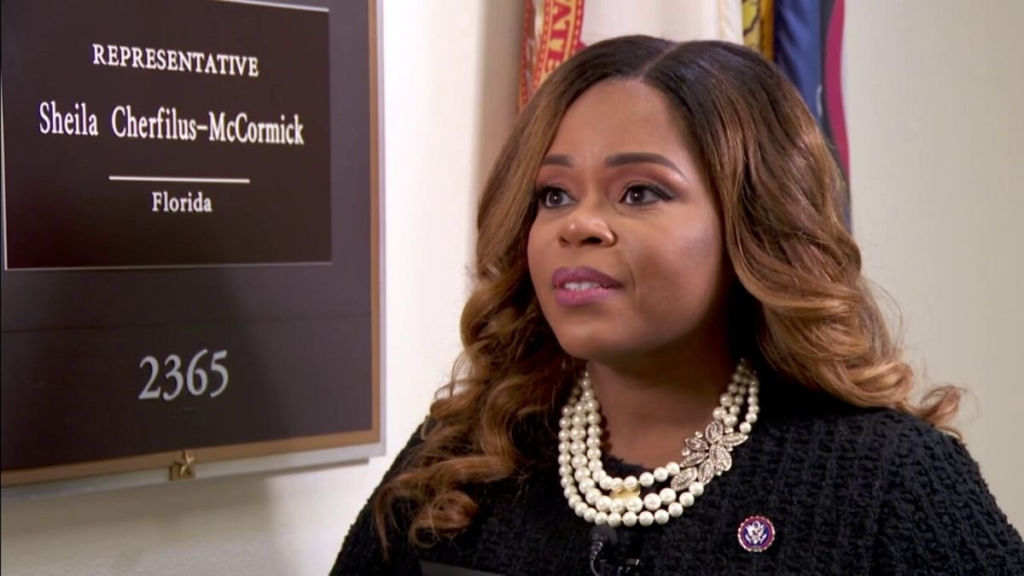
| Background In November 2021, Sheila Cherfilus-McCormick ran for the U.S. House in Florida’s 20th district. Facing a competitive primary, her campaign sought innovative methods to engage voters effectively. Strategy The campaign targeted approximately 90,000 “super voters”—individuals with a consistent voting history in past elections. They employed CallHub’s MMS (Multimedia Messaging Service) to send personalized messages enriched with images and videos, enhancing voter engagement. Results: 1. Sent over 140,000+ MMS messages. 2. Achieved a 2% opt-out rate because of targeted outreach and MMS messaging, significantly lower than the industry average of around 5%. 3. Sheila won the primary with just five votes. By leveraging CallHub’s MMS broadcasting capabilities, Sheila’s campaign effectively engaged voters, contributing to her narrow victory in a highly competitive election. Read more about how she won incredibly using CallHub here: Sheila for Congress: How MMS Broadcasts Won Her Votes |
Types of political text messaging campaigns
Political campaigns utilize text messaging for a variety of use cases to achieve specific objectives. Here are some common types:
1. Surveys
Survey-based texting is a common form of political texting, where campaigns collect voter opinions, preferences, and feedback to tailor their best campaign messages. Between 2020 and 2022, the number of national pollsters using text message surveys increased from 1 to 9, representing an 800% growth. Here’s an example of a survey text message:
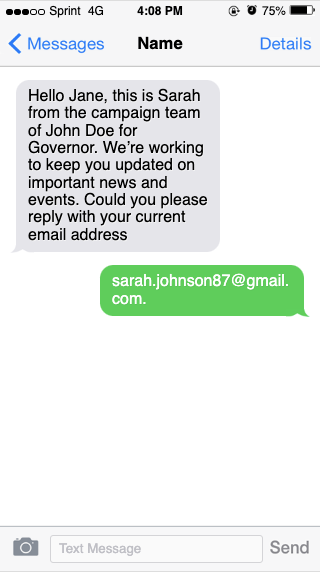
2. Sign-in campaigns
Sign-in campaigns encourage supporters to register for events, pledge support, or confirm voting intentions. With opt-in text messaging, the average opt-out rate ranges from 0% to 1.5%, showing that most recipients are open to receiving updates.
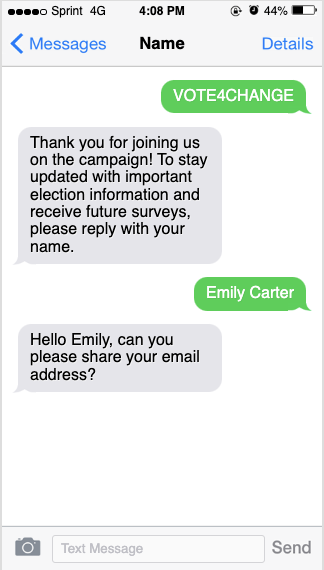
3. Fundraising
Fundraising texts are a key part of political text messaging, soliciting donations for campaign activities and often including a direct link to a donation page for easy contributions. In the 2020 elections, political text messaging helped generate nearly half of small-dollar donations, with 45.71% of candidate texts being direct donation requests.

4. GOTV
GOTV texts provide voters with essential information about polling locations, hours, and deadlines, aiming to increase voter turnout. The 2019 European Parliament election in Sweden revealed that a simple text message reminder increased the likelihood of voting by 0.3 percentage points.
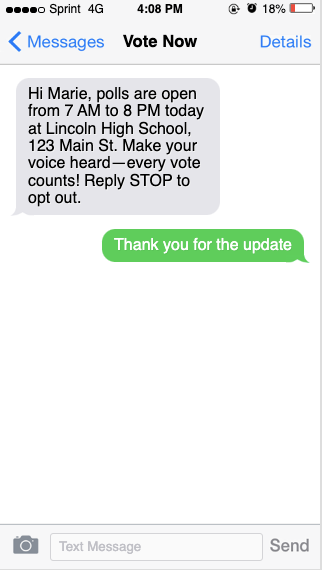
How to run political text messaging campaigns with CallHub
In this section, let’s explore how CallHub helps you engage with supporters effectively through various types of political text messaging:
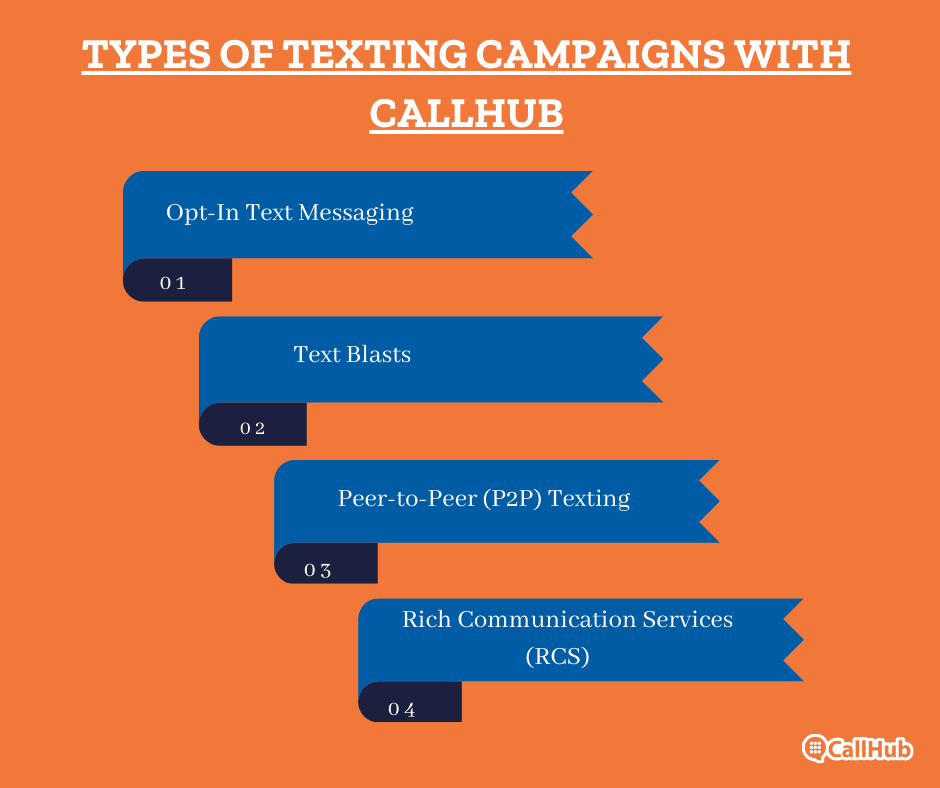
1. Opt in as political text messaging campaigns

SMS opt-in is a powerful tool for your political campaign. This political text messaging tool allows you to build a list of engaged supporters. This can be especially useful for fundraising efforts, event promotions, or updates on key issues.
You can use opt-in text messaging to reach potential donors by offering them an easy way to support your campaign.
For example:
“Hi Arian, Team For Change needs you! Help us raise $50,000 for progressive policies. Text ‘JOIN’ to donate and make an impact!”
This message makes it clear what the campaign needs, provides a clear action plan, and adds a personal touch by mentioning supporters’ role in the cause. By getting supporters to opt in through political SMS, you can follow up with regular updates and keep them engaged.
| With CallHub’s text-to-join platform, you can use/rent short codes to simplify responses. Plus, CallHub allows you to resend messages after a few hours/days, ensuring your supporters get to know about your initiative. |
Read Also: How to set up opt-in text messages
2. Text blasts or mass texting
Mass text blasts are a powerful way to send out mass political SMS to a large group of supporters, keeping them updated on campaign events, calls to action, and important issues. Text blasts enable you to quickly reach a wide audience with a single message, with just one click!
For example:
“Hey Cian, Team For Change is hosting a rally tomorrow at 6 PM! Join us at the City Hall to support progressive policies. Together, we can make a difference. RSVP by texting ‘YES’ now!”
This political text messaging form creates urgency, highlights an important event, and gives clear instructions on how supporters can take immediate action.
| With CallHub’s mass texting service, you can streamline communication and boost engagement for your campaign through features like message scheduling, automated replies, and the ability to avoid texting litigators. |
Read Also: List of best bulk messaging platforms
3. Peer-to-peer texting as political text messaging campaings

Peer-to-peer texting allows you to send personalized, one-on-one messages to your supporters, creating a more personal connection. It’s perfect for building relationships and nurturing strong connections with your supporters. Imagine you’re reaching out to undecided voters in your district. You send a political SMS like this:
“Hi Sarah, the election is just around the corner, and your vote could make all the difference. Do you have any questions or need help finding your polling location?
This kind of political text messaging sparks a conversation to ensure compliance with communication standards, providing voters with the information they need while also showing that your campaign is listening and cares about their concerns. By responding directly to questions and fostering a conversation, you increase the likelihood of those supporters casting their votes.
| With CallHub’s P2P texting features like auto-sent initial messages, saved replies, conversation tagging, and a profanity filter, conversations are streamlined and compliant. This makes P2P texting both efficient and effective for mobilizing voters. |
Read Also: Peer-to-peer texting events guide.
4. RCS as political text messaging campaings
Rich Communication Services (RCS) is an advanced messaging service that enhances traditional political SMS by offering features like rich media content, read receipts, and interactive elements. RCS provides a dynamic platform for political campaigns to engage supporters with enriched content and interactive experiences.
For Example:
Hey Cian! 👋 We need your input! Team For Change is making big decisions, and we want to know your opinion! 🗳️ Please reply with your choice below:
1️⃣ Should we host more rallies this year?
- Yes, definitely! 🎉
- No, focus on other efforts. 🤔

| CallHub has now integrated Rich communication services (RCS) into its platform, enabling political campaigns to send rich, interactive content like images, large videos, audio files, and GIFs. This makes your political SMS messages more engaging and effective in prompting actions like RSVPs, donations, or other key interactions. |
Must have features for effective political text messaging
When evaluating political text messaging tools, it’s essential to prioritize features that enhance engagement, ensure compliance, and provide actionable insights. Below are key features to consider:
1. Multimedia Messaging Service (MMS):
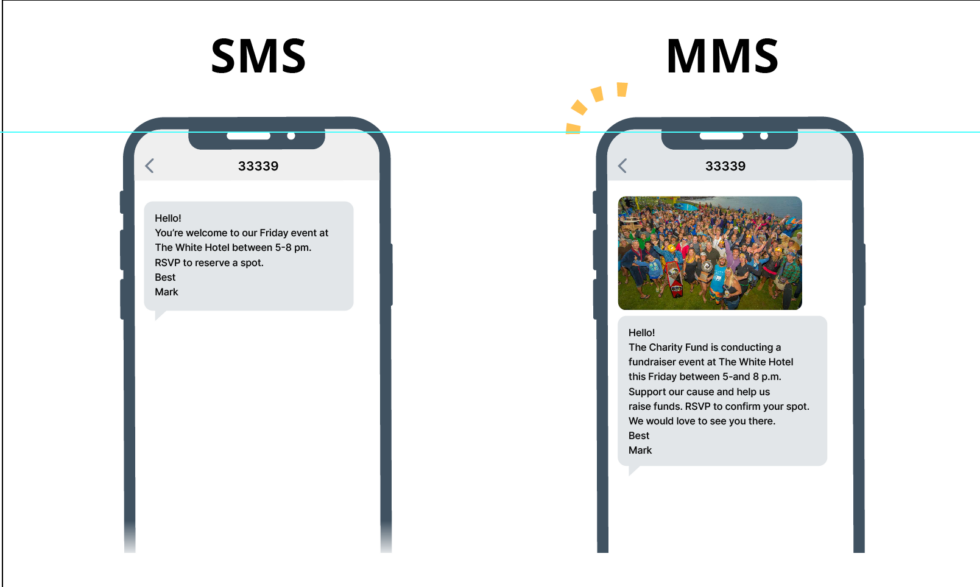
Have you ever felt like your texts are getting ignored? This can be because of your plain political SMS. Incorporating images, GIFs, or short videos can make your messages stand out and capture attention.
MMS messages have been shown to achieve up to 250% higher engagement rates compared to standard SMS messages. Also, videos increase brand recall by 33% and message recall by 45%. This means your message doesn’t just get delivered—it will be read and interacted with.
Imagine you’re sending a simple political SMS about an event versus a captivating image or short video invite. Which one would catch more eyes and drive higher attendance? The answer is clear.
Platforms like CallHub enable you to send MMS through peer-to-peer and text broadcasts, offering up to 1,600 characters for more impactful messaging.
Read Also: MMS marketing best practices
2. Branded links
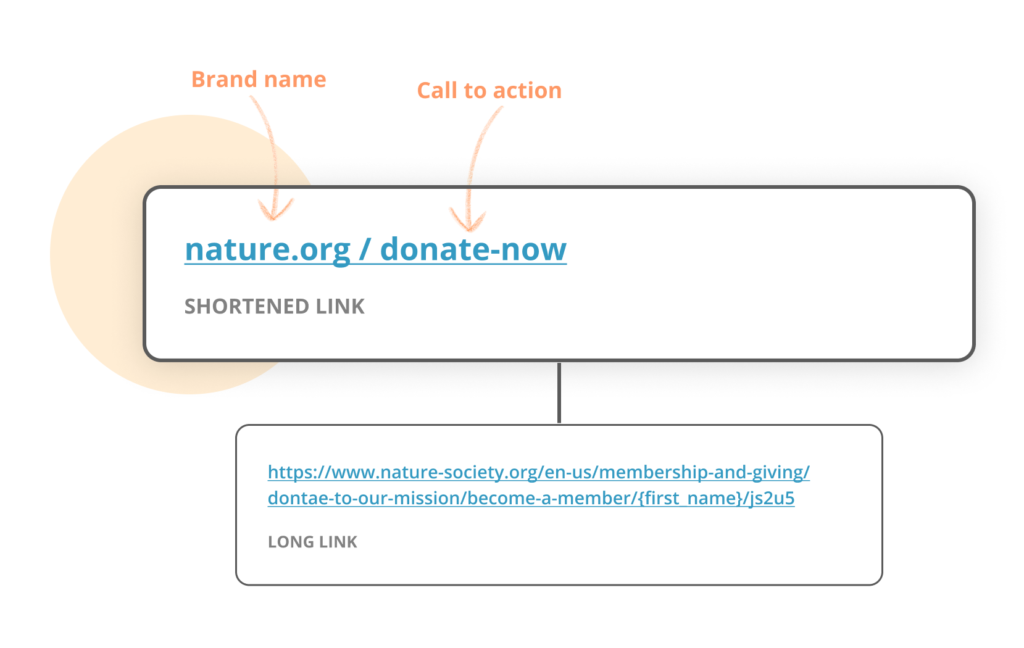
Imagine sending a text message where the link looks clean and proudly displays your campaign’s name—instantly recognizable and trustworthy. That’s the power of branded links. Instead of generic shortened URLs, you present supporters with customized links like ‘vote.yourcampaign.org/event,’ reinforcing your identity at every touchpoint.
Benefits:
- Increased click-through rates: Branded links can increase CTR by 39%, making your peer-to-peer texting and text banking campaigns more effective.
- Enhanced trust: Supporters instantly recognize the source, reducing concerns about political spam texts and boosting engagement.
- Improved deliverability: Using branded links can reduce the chances of messages being filtered as spam by carriers, ensuring higher delivery rates.
CallHub’s Link Shortener and Tracker lets campaigns create branded links, track engagement, and optimize targeting. Campaigns have seen up to a 34% boost in engagement using branded links. As shown in the image, you can use the “customize backhalf” option to enter your brand/initiative name for added recognition.
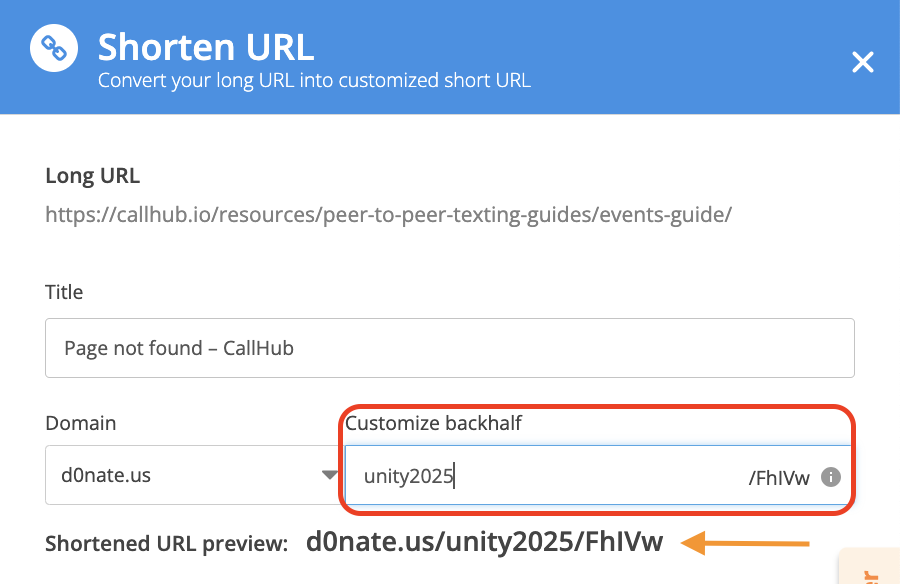
3. 10 DLC

10DLC refers to standard 10-digit phone numbers sanctioned by mobile carriers for A2P political text messaging, allowing organizations to send high volumes of text messages or calls efficiently.
Benefits:
- Improved deliverability: Registered 10DLC numbers are recognized and prioritized by carriers, meaning fewer messages are flagged as spam or blocked.
- Reduced spam: The 10DLC system helps reduce spam by ensuring that messages are sent from legitimate sources.
- Better service: Carriers have visibility into the “who” and “what” of each messaging campaign, allowing them to provide a better quality of service for GOTV texts, text banking, volunteers, etc..
- Increased trust: Using an officially sanctioned business messaging number can help build trust with the public.
CallHub offers 10DLC for both calling and political texting campaigns, ensuring higher deliverability and compliance with carrier regulations. To get a 10DLC number, you’ll need to complete a simple registration process. Learn how to register and start using 10DLC for your campaigns.
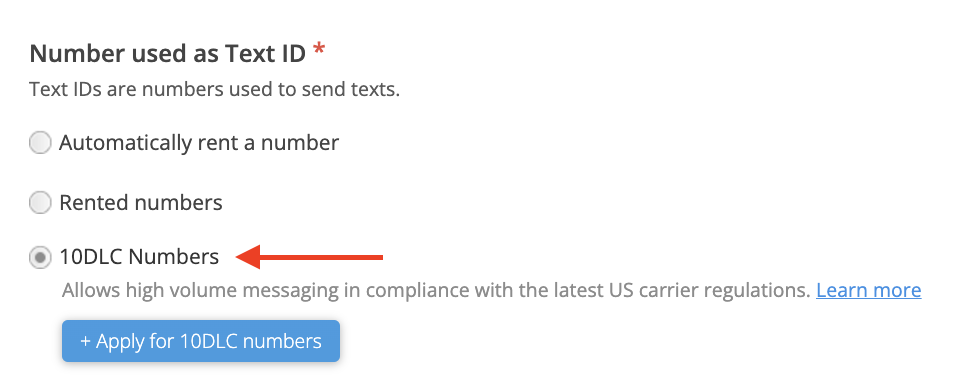
4. Profanity filter
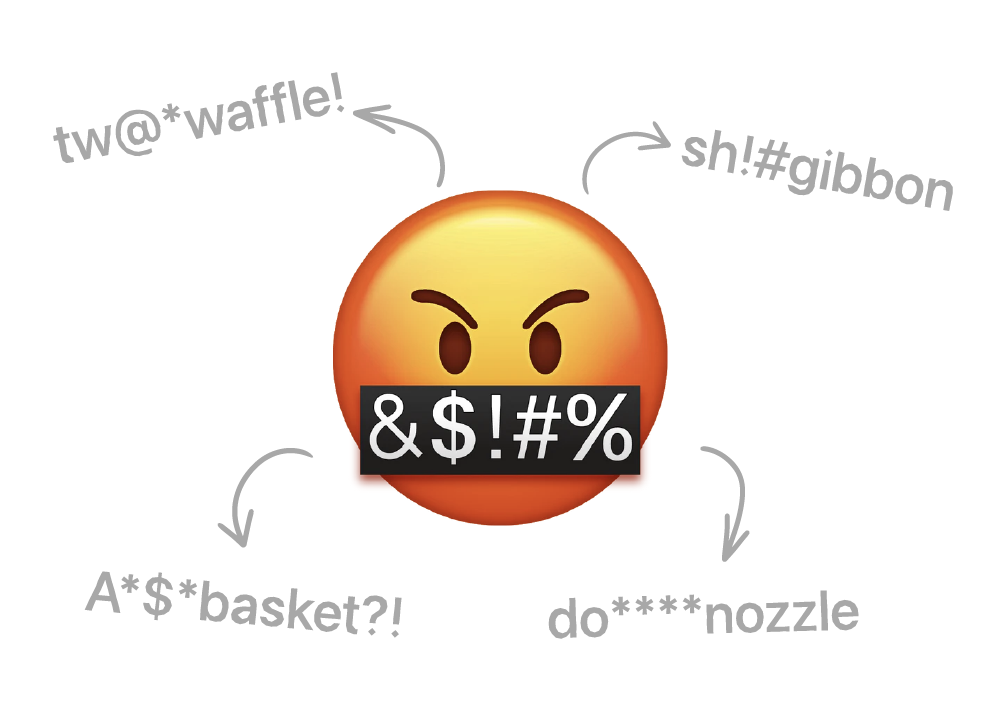
In political text messaging, maintaining a respectful tone is essential for keeping your campaign volunteers safe. CallHub’s profanity filter automatically detects and blocks profane replies during texting campaigns.

Whether sending GOTV texts or running a text banking campaign, this feature ensures you follow CTIA guidelines by preventing offensive content from reaching your team or agents.
Benefits:
- Enhanced professionalism: Maintains a respectful communication environment by filtering out offensive language, aligning with best practices in political texting.
- Operational efficiency: Prevents agents from exposure to inappropriate content, ensuring focus on constructive interactions in peer-to-peer texting campaigns.
- Compliance assurance: Helps adhere to CTIA guidelines and TCPA text message exemptions, mitigating legal risks associated with political SMS communications.
Implementing a profanity filter is crucial to fostering positive voter engagement and upholding your campaign’s integrity.
5. Merge tags
The shift from “Hi, please support us” to “Hi Linda, please support us” can significantly enhance the effectiveness of your political text messaging campaigns. With CallHub’s merge tags, this level of personalization becomes automated, allowing you to tailor your messages for more significant impact.
Some merge tags include:
- First name
- Last name
- Phone number, etc., and many more
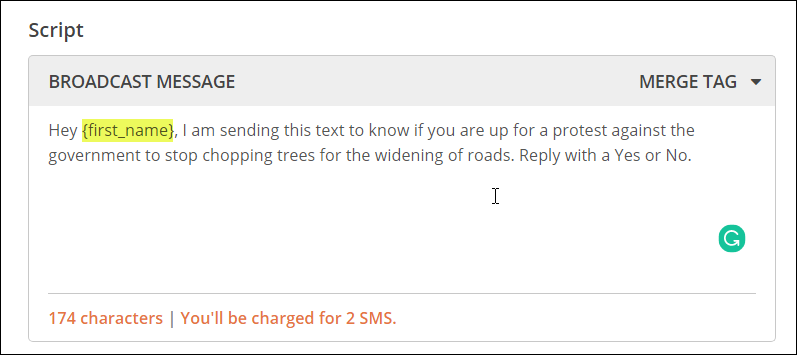
Some benefits are:
- Strengthened voter relationships: Personalized communication fosters trust and loyalty, as voters feel their needs and opinions are acknowledged.
- Increased engagement: Personalized emails and documents are more likely to be opened, read, and acted upon, leading to higher engagement rates.
- Data-driven marketing: Merge tags allow you to leverage the data you collect about your audience to create more targeted and effective political messaging.
Now that you’ve got the key features, let’s dive into the rules that keep your political text campaigns on track and penalty-free!
Political text messaging rules and regulations you must know
Political text messaging has become one of the most effective ways to engage voters and support political advertising. However, campaigns must follow rules and regulations to stay compliant and avoid penalties. Let’s first see the rules
USA:
- Consent requirements: Political text messaging campaigns that use auto-dialed or prerecorded methods must obtain the recipient’s prior express consent. This ensures compliance with opt-in text messaging rules under the TCPA.
- Opt-out mechanism: Every political SMS must provide a straightforward and easy way for recipients to opt-out, such as replying “STOP.” This helps reduce political spam texts and maintain a positive reputation.
- Compliance with TCPA: All political texting campaigns must adhere to the Telephone Consumer Protection Act (TCPA), which governs unsolicited communications. Be aware of TCPA text message exemptions for manual texting.
- Avoid data scraping: Do not collect phone numbers through unauthorized data scraping methods. Only use legitimate sources, such as publicly available voter registration data, for political text messaging outreach.
- Consent not always required: Political campaigns may not need prior consent if they avoid using random or sequential number generators to send messages, as clarified by recent rulings.
- Identification and disclaimers: All political text messaging must clearly identify the sender and include the necessary disclaimers. Transparency is key to ethical advertising in politics.
- 10DLC registration: Register 10-digit long codes (10DLC) to comply with carrier requirements for application-to-person (A2P) messaging. This improves deliverability and reduces the risk of being flagged as political spam texts.
- CTIA guidelines compliance: Following CTIA guidelines is essential for maintaining message quality, ensuring trust, and avoiding issues with carriers. These guidelines help standardize political text messaging practices and ensure compliance.
For more information on staying compliant with TCPA regulations, refer to CallHub’s comprehensive TCPA Compliance Checklist.
Canada
In Canada, political text messaging is regulated to ensure transparency and protect consumers from unwanted communications. Here are the key rules and regulations governing political texting:
- Consent requirements: Under Canada’s Anti-Spam Legislation (CASL), political entities must obtain express consent before sending commercial electronic messages (CEMs), including text messages, unless exempted.
- Identification requirements: All political SMS messages must identify the sender and the purpose of the message, ensuring transparency in political advertising.
- Voter contact registry: During federal elections, entities engaging in text banking or other outreach efforts must register with the CRTC’s Voter Contact Registry within 48 hours of initiating contact.
- Exemptions for political entities: Political parties, riding associations, and candidates are exempt from specific CASL provisions when sending CEMs primarily to solicit financial or non-monetary contributions.
- National Do Not Call List (DNCL): Although political entities are exempt from DNCL rules, they must still maintain and respect their internal do-not-call lists. This ensures that recipients can avoid political spam texts and unwanted outreach.
- Personal Information Protection And Electronic Documents Act (PIPEDA): Political tools like text banking must ensure that explicit consent is obtained before sharing personal data with third parties, and only necessary information should be collected.
- Time restrictions: Automated calls can only be placed between 9:00 am and 9:30 pm on weekdays and 10:00 am to 6:00 pm on weekends, adhering to any stricter provincial time limits.
For more detailed information on Canadian outreach regulations, visit the full article here.
Political text messaging – A gamechanger for campaigns
Political text messaging has become an indispensable tool for modern campaigns, enabling direct and personalized engagement with voters. By leveraging effective strategies and compliant tools, campaigns can significantly enhance their outreach efforts. Join CallHub today to transform your campaign’s outreach with simple text messages. Schedule a call with our experts and get your questions answered. Choose a time that is best for you.




